Farewell: 5 Effective Physician Retirement Letter Examples
Although retirement is something to celebrate, there are a few hoops you need to jump through before it’s time for some rest and relaxation, especially if you’re a physician. Here are effective examples of physician retirement letters.

The average age of the 985,000 licensed physicians in 2018 was 51.5 years. The biennial census conducted by the Federation of State Medical Boards (FSMB) concluded that the average age of its workforce rose by almost 1 full year since 2010.
Yet, many experts believe that both of those statistics underestimate the trend of an aging physician workforce.
The reason why statisticians believe that way is due to more specific data from the pool of census responses like…
- The number of licensed physicians between 60 and 69 years old grew by almost 20%.
- The number of licensed physicians 70 and older grew by almost 11%
- 37% of male licensed physicians were 60 years of age or older

The medical professional workforce is so old that there will be a shortage of almost 150,000 doctors by 2025. That fact still holds even if medical schools increase their enrollment.
The point I’m trying to make with all of this isn’t to explain the healthcare industries’ workforce shortage, which falls outside of the scope of this blog. It also isn’t to make you feel bad, especially if you’re a doctor who falls in any of the age ranges I highlighted.
Instead, it’s to point out that retirement is in sight for many doctors. The average age of retirement is almost 70 years old in the United States. So, the majority of doctors are a part of an aging workforce that has devoted the last 20 plus years to the medical industry.
Retirement is a well-deserved phase in life that means more time for relaxation, traveling and visiting with family and friends. But before you get more time to devote to improving your backswing, there’s a lot of planning that needs to take place.
I’m not referring to planning on which golf courses to play at. Instead, I’m talking about making your official retirement announcement to your coworkers and, more importantly, to your patients.
If you’re a doctor who’s about to retire, you have a whole host of regular patients who seek your medical expertise for their ailments. Some of these patients might even list you as one of their professional references in their resumes.
In other words, they’re counting on you.
You need to make sure that they know you’re retiring so that they have enough time to switch their doctor sooner rather than later. Otherwise, they’re not going to share in your excitement the next time they come in for an appointment and you aren’t there to give them the care that they need.
But what’s the best way to tell them? Although it would be great if you could tell each of them in person about your upcoming retirement, it’s not realistic to assume that they’re all going to come in for an appointment before your last day.
Thus, your best option is to create and send out a retirement letter to your patients.
Make It Personable
The tone you use throughout your retirement letter is the most important aspect of the entire document.
Since you’re writing a letter about yourself and your next stage in life, you should make it as personable as possible. Tell your patients…
- How long of a career you’ve had
- How much of an honor it has been to serve them
- When you plan on retiring
- What you plan on doing during retirement
Each of those talking points helps encourage the celebration of you and your accomplishments while thanking your clients for the privilege to provide them care. They also help ease the transition all of your patients will have to go through in selecting a new provider.
After all, the leading reasons why your clients stayed as your patients all of these years was because they thought you brought great treatment for a great value.
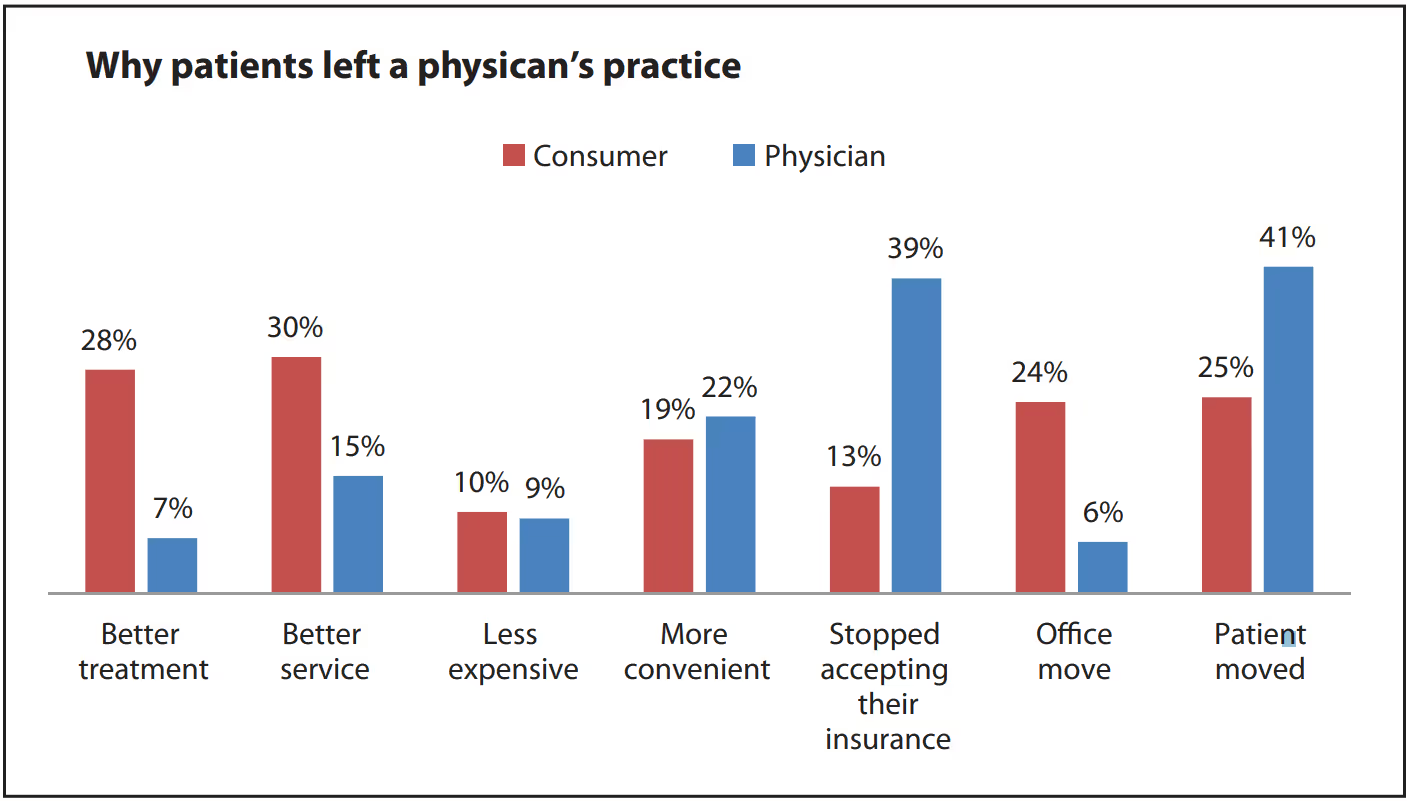
There are design elements you should consider adding in as well to further personalize what you’re sending to your clients.
Adding your practice’s logo, a picture of yourself and your signature at the bottom are all nice touches that can go a long way in making your retirement letter more personable.
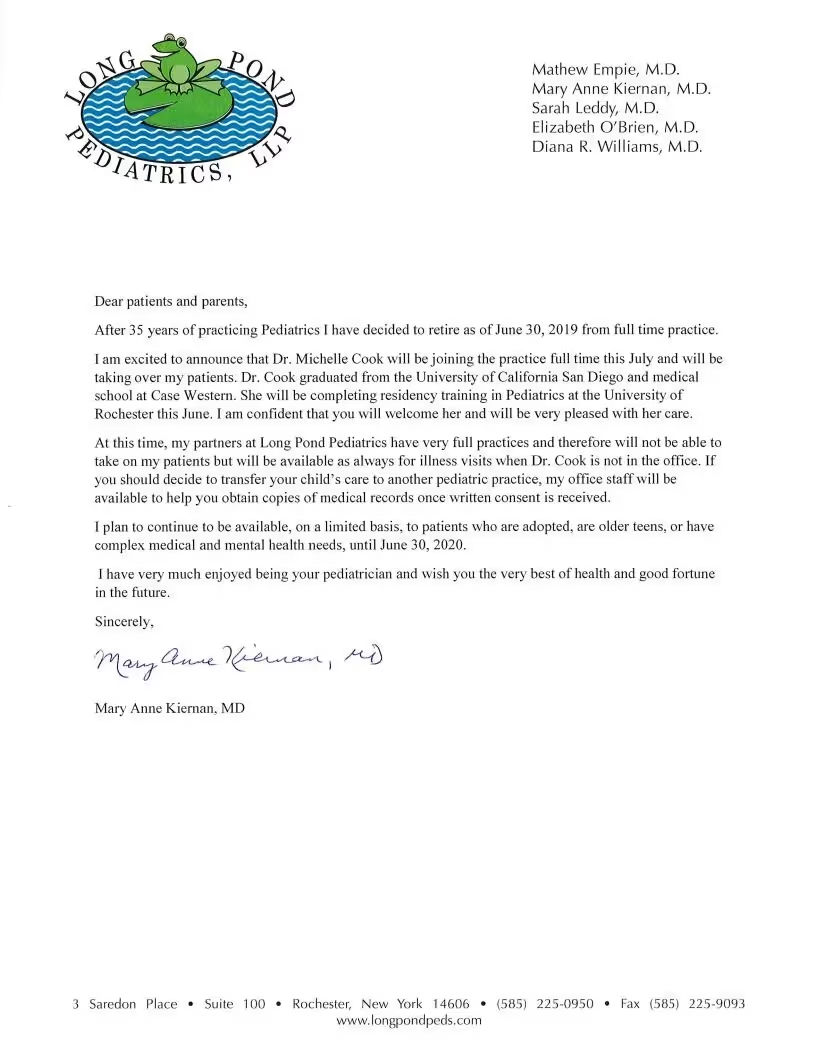
The example letter above from Long Pond Pediatrics looks very professional and includes personal elements.
If you wanted to take it a step further, you could add personal anecdotes to each letter. It will take more time since those wouldn’t allow you to mass-produce what you send. However, what you add could go a long way in having your patient celebrate with you.
If you go that route, though, I do have to caution you about what you say. Be careful not to overshare and accidentally add a story that contains protected health information. The last thing you’ll want to deal with on your way out is an unintentional HIPAA violation.
Consult With a Healthcare Attorney
As I mentioned in the introduction, retirement is something to celebrate. However, retiring as a licensed physician is a much more involved process. If you don’t go through the proper avenues at the end of your career, you could face some serious legal ramifications.
Throughout the rest of this blog post, I’ll mention how you should write your announcement letter yourself and be as genuine as possible so that your patients can celebrate your achievement with you.
However, you should always consult with a healthcare attorney after you’ve written your final draft.
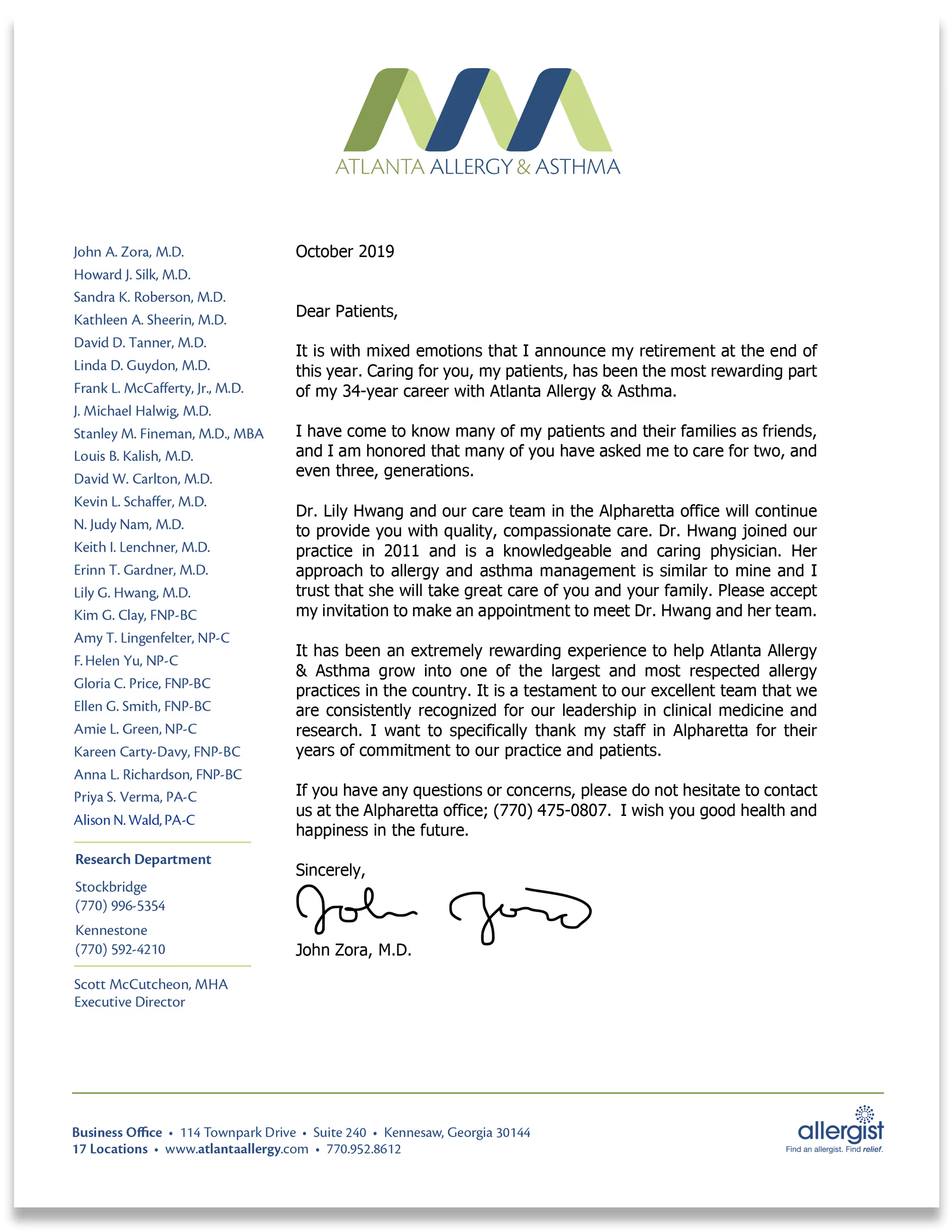
Receiving a retirement letter is going to surprise a lot of your patients. Of course, they should embrace your announcement, especially if you’re at or above the average ages I mentioned during the introduction.
Yet, the reality is that some of your patients will get upset with you hanging up your lab coat. They’re going to have to go through the whole process of trying to find a new doctor, introducing themselves and filling out a bunch of new paperwork. Sure, all of those are selfish reasons, but they’re valid feelings. Especially when you consider the state of modern healthcare and how clunky some of its processes are.
Unfortunately, with the rates of medical errors being as high as they are, you most likely already have a professional relationship with a healthcare attorney.
Have the lawyer take a look at the letter you plan on writing to ensure that you’re covering your bases so that you don’t run into any accidental legal issues on your way out.
Adequate Replacements and When to Send
One of the must-adds to include in your retirement letter are your recommendations for physician replacements.
It’s a best practice to give recommendations for adequate replacement physicians so that you don’t end up with a claim of patient abandonment.
I imagine that you have a whole network of physicians with whom you’ve established a professional relationship over the years.
Hopefully, not all of those doctors are in the same situation as you and are toward the later stages of their careers. You don’t want to recommend to your patients that they switch their doctor to another professional you know only to have them retire a year later. That’s a frustrating scenario.
If you don’t know of any replacement physicians who aren’t close to retirement, you have some research to do.
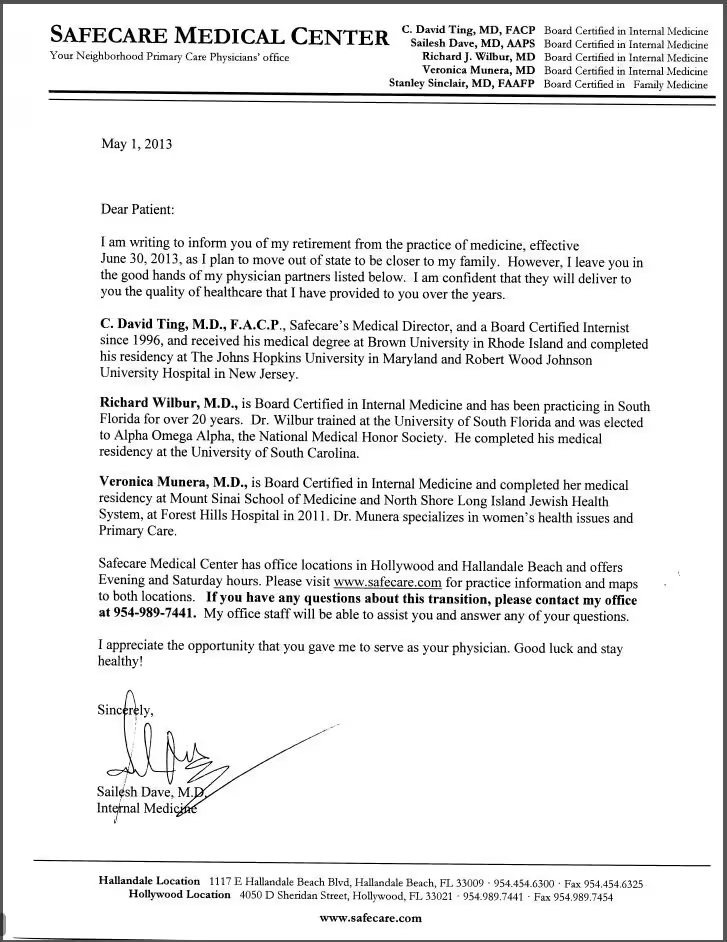
In any case, once you have a list of professionals you feel comfortable referencing your patients, it's then time to start evaluating their placement on an individual level. Sit down and think about each of your patients; their medical history, their personality traits and mannerisms.
Then recommend a handful of physicians from your list you think would mesh well with an individual patient.
Once you have your list of replacements, it’s time to think about when you should send your retirement letters out. Hopefully, you started this process well in advance of your actual retirement date. Otherwise, you might have to push it back if you aren’t giving your patients enough time.
The reality is that you’re required by law in some states to tell your patients that you’re retiring within a certain amount of time before your last day. If you don’t, similar accusations of patient abandonment may surface.
The general recommendation is that patients should receive your notification of retirement somewhere between 60-90 days before your last day.
Edit for Digital
Although sending a physical letter through the mail is likely the most effective way to let your patients know that you’re retiring. It isn’t the only option you should count on.
As I’m sure you know from your years of experience trying to collect payment from your patients, sending mail doesn’t always work. Physical mail opens up the potential to address errors, whether through typos or because the patients you sent your mail to move.
Furthermore, your patients have preferences as to how they would like to stay in communication with you based on what generation they’re a part of.
Keeping the minutia in mind matters for your retirement letter as well, especially when you consider the legal ramifications at stake.
The solution to all of this is to transfer your letter into a digital format.

Of course, there are a few digital formats that you should consider. First, you should turn it into a social shareable image. The retirement announcement example above comes from CVFP Medical Group.
Its original purpose was to announce Dr. Kim Wright’s retirement on their blog.
However, due to its format and size it’s also perfect to post across the social media channels that CVFP uses and/or included in an email newsletter that they might send to their patients.
By using all available avenues to make your announcement, you’re ensuring that your patients, coworkers, business partners and other entities know that you’re retiring. As a result, they’re more likely to celebrate with you and you’re less likely to run into any underlying legal issues.
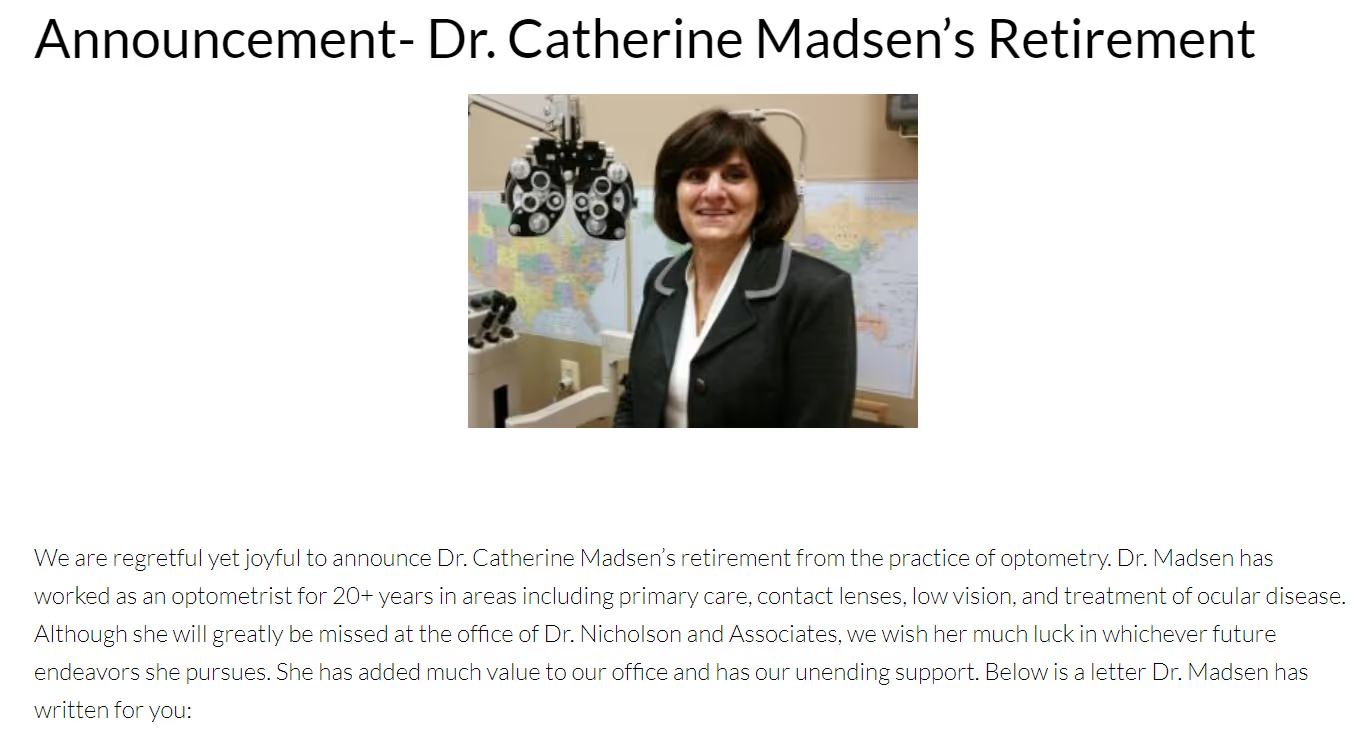
Conclusion
The healthcare industry is an aging population. As I highlighted at the very beginning, it’s aging at such a rapid pace that there’s going to be a physician shortage. Although that likely means a higher rate of burnout for medical professionals, there’s nothing you can do personally about it.
If you’re reading this blog post it means that either you’re thinking about retiring within the next few years or months. You’ve earned the right to retire, especially after serving your patients for as long as you have.
Nevertheless, there are best practices to keep in mind while drafting the letter that helps your patients, protects you from potential legal ramifications and kicks off the celebration.
The example letters and announcements provided in this blog post provide you with great references to use as the basis for your retirement letters.
Emphasize your product's unique features or benefits to differentiate it from competitors
In nec dictum adipiscing pharetra enim etiam scelerisque dolor purus ipsum egestas cursus vulputate arcu egestas ut eu sed mollis consectetur mattis pharetra curabitur et maecenas in mattis fames consectetur ipsum quis risus mauris aliquam ornare nisl purus at ipsum nulla accumsan consectetur vestibulum suspendisse aliquam condimentum scelerisque lacinia pellentesque vestibulum condimentum turpis ligula pharetra dictum sapien facilisis sapien at sagittis et cursus congue.
- Pharetra curabitur et maecenas in mattis fames consectetur ipsum quis risus.
- Justo urna nisi auctor consequat consectetur dolor lectus blandit.
- Eget egestas volutpat lacinia vestibulum vitae mattis hendrerit.
- Ornare elit odio tellus orci bibendum dictum id sem congue enim amet diam.
Incorporate statistics or specific numbers to highlight the effectiveness or popularity of your offering
Convallis pellentesque ullamcorper sapien sed tristique fermentum proin amet quam tincidunt feugiat vitae neque quisque odio ut pellentesque ac mauris eget lectus. Pretium arcu turpis lacus sapien sit at eu sapien duis magna nunc nibh nam non ut nibh ultrices ultrices elementum egestas enim nisl sed cursus pellentesque sit dignissim enim euismod sit et convallis sed pelis viverra quam at nisl sit pharetra enim nisl nec vestibulum posuere in volutpat sed blandit neque risus.

Use time-sensitive language to encourage immediate action, such as "Limited Time Offer
Feugiat vitae neque quisque odio ut pellentesque ac mauris eget lectus. Pretium arcu turpis lacus sapien sit at eu sapien duis magna nunc nibh nam non ut nibh ultrices ultrices elementum egestas enim nisl sed cursus pellentesque sit dignissim enim euismod sit et convallis sed pelis viverra quam at nisl sit pharetra enim nisl nec vestibulum posuere in volutpat sed blandit neque risus.
- Pharetra curabitur et maecenas in mattis fames consectetur ipsum quis risus.
- Justo urna nisi auctor consequat consectetur dolor lectus blandit.
- Eget egestas volutpat lacinia vestibulum vitae mattis hendrerit.
- Ornare elit odio tellus orci bibendum dictum id sem congue enim amet diam.
Address customer pain points directly by showing how your product solves their problems
Feugiat vitae neque quisque odio ut pellentesque ac mauris eget lectus. Pretium arcu turpis lacus sapien sit at eu sapien duis magna nunc nibh nam non ut nibh ultrices ultrices elementum egestas enim nisl sed cursus pellentesque sit dignissim enim euismod sit et convallis sed pelis viverra quam at nisl sit pharetra enim nisl nec vestibulum posuere in volutpat sed blandit neque risus.
Vel etiam vel amet aenean eget in habitasse nunc duis tellus sem turpis risus aliquam ac volutpat tellus eu faucibus ullamcorper.
Tailor titles to your ideal customer segment using phrases like "Designed for Busy Professionals
Sed pretium id nibh id sit felis vitae volutpat volutpat adipiscing at sodales neque lectus mi phasellus commodo at elit suspendisse ornare faucibus lectus purus viverra in nec aliquet commodo et sed sed nisi tempor mi pellentesque arcu viverra pretium duis enim vulputate dignissim etiam ultrices vitae neque urna proin nibh diam turpis augue lacus.


.avif)

